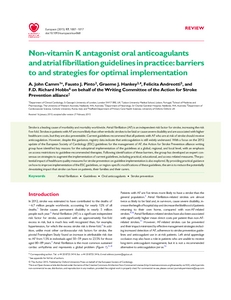Camm, AJ; Pinto, FJ; Hankey, GJ; Andreotti, F; Hobbs, FD; Writing Committee of the Action for Stroke Prevention alliance
(2015)
Non-vitamin K antagonist oral anticoagulants and atrial fibrillation guidelines in practice: barriers to and strategies for optimal implementation.
Europace, 17 (7).
pp. 1007-1017.
ISSN 1532-2092
https://doi.org/10.1093/europace/euv068
SGUL Authors: Camm, Alan John
![[img]](https://openaccess.sgul.ac.uk/107468/1.hassmallThumbnailVersion/Non-vitamin%20K%20antagonist%20oral%20anticoagulants%20and%20atrial%20fibrillation%20guidelines%20in%20practice%3A%20barriers%20to%20and%20strategies%20for%20optimal%20implementation..pdf)  Preview |
|
["document_typename_cannot open `/data/SGUL/sgul/eprints3/archives/sgul/documents/disk0/00/10/74/68/01/Non-vitamin' (No such file or directory)
cannot open `K' (No such file or directory)
cannot open `antagonist' (No such file or directory)
cannot open `oral' (No such file o" not defined]
Published Version
Available under License Creative Commons Attribution Non-commercial.
Download (504kB)
| Preview
|
Abstract
Stroke is a leading cause of morbidity and mortality worldwide. Atrial fibrillation (AF) is an independent risk factor for stroke, increasing the risk five-fold. Strokes in patients with AF are more likely than other embolic strokes to be fatal or cause severe disability and are associated with higher healthcare costs, but they are also preventable. Current guidelines recommend that all patients with AF who are at risk of stroke should receive anticoagulation. However, despite this guidance, registry data indicate that anticoagulation is still widely underused. With a focus on the 2012 update of the European Society of Cardiology (ESC) guidelines for the management of AF, the Action for Stroke Prevention alliance writing group have identified key reasons for the suboptimal implementation of the guidelines at a global, regional, and local level, with an emphasis on access restrictions to guideline-recommended therapies. Following identification of these barriers, the group has developed an expert consensus on strategies to augment the implementation of current guidelines, including practical, educational, and access-related measures. The potential impact of healthcare quality measures for stroke prevention on guideline implementation is also explored. By providing practical guidance on how to improve implementation of the ESC guidelines, or region-specific modifications of these guidelines, the aim is to reduce the potentially devastating impact that stroke can have on patients, their families and their carers.
| Item Type: |
Article
|
| Additional Information: |
© The Author 2015. Published by Oxford University Press on behalf of the European Society of Cardiology.
This is an Open Access article distributed under the terms of the Creative Commons Attribution Non-Commercial License (http://creativecommons.org/licenses/by-nc/4.0/), which permits non-commercial re-use, distribution, and reproduction in any medium, provided the original work is properly cited. For commercial re-use, please contact journals.permissions@oup.com |
| Keywords: |
Atrial fibrillation, Guidelines, Oral anticoagulants, Stroke prevention, Writing Committee of the Action for Stroke Prevention alliance, Cardiovascular System & Hematology, 1103 Clinical Sciences |
| SGUL Research Institute / Research Centre: |
Academic Structure > Molecular and Clinical Sciences Research Institute (MCS)
Academic Structure > Molecular and Clinical Sciences Research Institute (MCS) > Cardiac (INCCCA) |
| Journal or Publication Title: |
Europace |
| ISSN: |
1532-2092 |
| Language: |
eng |
| Publisher License: |
Creative Commons: Attribution-Noncommercial 4.0 |
| Projects: |
|
| PubMed ID: |
26116685 |
| Dates: |
| Date |
Event |
| 2015-07 |
Published |
| 2015-06-26 |
Published Online |
| 2015-02-27 |
Accepted |
|
 |
Go to PubMed abstract |
| URI: |
https://openaccess.sgul.ac.uk/id/eprint/107468 |
| Publisher's version: |
https://doi.org/10.1093/europace/euv068 |
Statistics
Item downloaded times since 22 May 2017.
Actions (login required)
 |
Edit Item |



